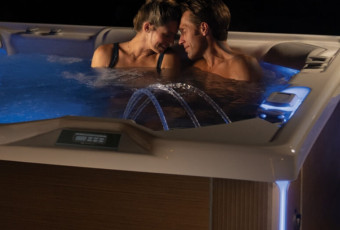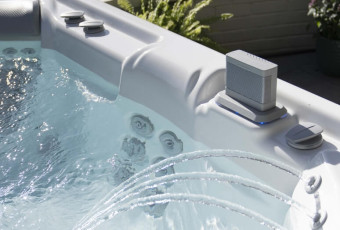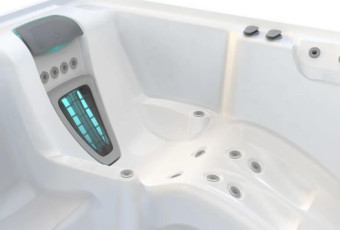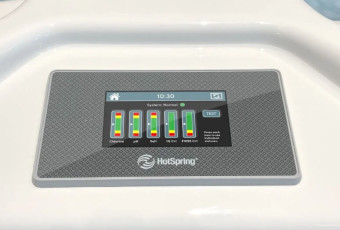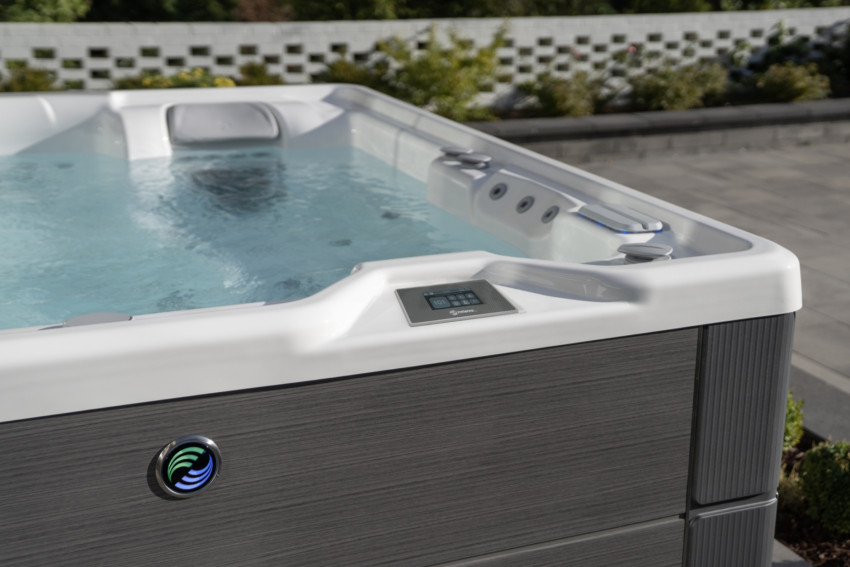Perhaps you spent a fun evening under the stars in a friend’s spa pool. Perhaps you lounged in an indoor spa in a luxurious hotel suite. In many ways indoor and outdoor spa pool experiences are quite similar - the powerful jets massaging your muscles, the warm water rejuvenating your body and mind, the delivery of comfort, pleasure, relief or all of the above. You enjoy the pleasure of a spa, the healing benefits of hydrotherapy, and all this at your disposal whenever you might need it - no matter whether it’s inside or outside, your personal hot tub is only ever a handful of steps away.
While the only true difference between indoor and outdoor spa pools is location, where you choose to place your spa makes a world of difference when it comes to installation, maintenance and usability. To help you decide whether an outdoor or indoor spa pool is best for your lifestyle, let’s take a look at the pros and cons of each.
Indoor spa pool pros and cons
Pros of owning an indoor spa pool
- Privacy: Your home is your sanctuary, offering the ultimate privacy. You can go from your indoor spa pool to your shower or to your bed without worrying about prying eyes. Whether you live in the city, the suburbs or the country, placing your spa pool inside your house will shield you from neighbours and passers-by.
- Convenience: Both indoor and outdoor spas are convenient, but an in-home model means that you rarely need to walk more than a few steps to use it, and can get to it without needing to pop on footwear or clothing. Speaking of which...
- Protection: Weather isn’t a factor for indoor spa pools, which you can enjoy in rain, hail and shine. Forget the shoes, the sunscreen and the sprint between your spa and your back door. Your cabinet and cover will also remain unblemished by the elements and airborne allergens won’t be a concern.
- Maximises unused space:If you have a large house or a recently emptied nest, why not make use of those currently unused rooms? The installation of a spa pool can turn an old bedroom, bathroom or office into a private paradise.

Image supplied by Refresh Renovations from a recent home extension to include an inside Highlife spa. Photograph by Helen Gwyther.
Cons of owning an indoor spa pool
- Accessibility: Spa pools come in all sizes, but most are larger than doorways, and manoeuvring them down corridors and around corners isn’t always possible. Before purchasing a spa pool, review its specifications and pre-delivery instructions, then measure doorways and hallways along the delivery path to ensure it will fit. You may need to make alterations to your home to fit the spa pool you want.
- Base installation: Your indoor spa pool will need a solid foundation - when filled with water, your spa can weigh over two tonnes. Depending on where you hope to place it, your floor may need significant reinforcement. Speak to a structural engineer or your local spa pool dealer for guidance on performing structural work safely and successfully.
- Plumbing: Not every room in the house has running water. If your proposed spa location does not have a faucet and sink, you’ll want to install one so you can easily drain and refill your spa pool (as regularly as your spa water care system demands.) You could run a hose from outside, but that can prove tricky and messy.
- Drainage: As people enter, exit or move around in a spa pool, water splashes are a fact of spa life, especially when the jets are on. Unless you install a drain, spilled water will remain on the floor and could cause costly damage. Without a drain you’ll also have to run a hose out of the room to empty your spa.
- Electricals: To connect your spa pool to power, you can either plug it into a wall socket or wire it directly to a 240v connection through your home’s central circuit breaker box. If you don’t have a powerpoint where you need one, you’ll have to install one. To prevent moisture-related short circuits, you’ll also need to install a ground fault circuit interrupter (GFCI) between your spa pool and power source. A qualified electrician must perform this work.
- Ventilation: Heated spa water creates steam which causes humidity. The combination of heat and humidity may damage plaster, drywall, paint or wallpaper, and provides the ideal environment for bacteria and fungi to grow. To mitigate this ambient dampness (and the odours it can create), you’ll need to invest in a ventilation system.
- Indoor water-resistance: To prevent costly damage to the room in which you place your spa, you’ll want to invest in water-resistant building materials. Any furniture and electronics should also be water resistant to safeguard against the increase in humidity, condensation and accidental splashes.
Outdoor spa pool pros and cons
Pros of owning an outdoor spa pool
- Easier installation: It’s easier to install a spa pool in your backyard than in your home. While you may still need to install a foundation and make the required outdoor electrical connections, the overall cost of installation should be lower. You’ll also still need to make sure that the delivery route is clear of debris and that the spa can fit down the path. Even if you have to move a section of fence to get the spa to its location, it’s far cheaper and easier than moving a wall.
- Natural ventilation: You don’t have to worry about ventilation outside. Any excess humidity your spa pool creates will be blown away by the wind and have no negative effects on your deck or patio.
- Natural drainage: Drainage is far less of a concern for an outdoor spa pool, as you can often empty straight out into a large drain or natural drainage site.
- A stunning soak: Australian nature is unique, stunning and world famous, and by placing your spa pool outside you get to enjoy the outdoors in all its glory. You can also admire your landscaping, watch the sunset, listen to the birds sing and watch the seasons change.
Cons of owning an outdoor spa pool
- Less privacy: If you can see your neighbours from your backyard spa, they can see you. Outdoor hot tubs can be less private than indoor spas, but if you take steps to cover your spa area, you can still enjoy a secluded soak. Fences, trees, hedges or our spa pool cover lifters can all act as privacy screens that retain the beauty and openness of the outdoors.
- Exposed to the elements: While the temperature inside the spa pool is always luxuriously toasty, you’ll still have to run the weather gauntlet to get there, and a soak may not be as tempting if it’s raining or hailing outside (though a hot tub umbrella can help.)
- Slightly less convenient: As above, the weather and the slightly greater distance to travel can make enjoying an outdoor spa pool a slightly less convenient experience than enjoying an indoor spa pool. You’ll also have to go outside to test and adjust your spa water, clean the filters and conduct all maintenance. The good news? Very few spa owners mind.
In some areas, like entertainment, both indoor and outdoor spa pools excel. Some spa manufacturers, like Hot Spring®, offer entertainment systems as standard and as upgrade options. Do you want to watch the footy or cricket from the comfort of your spa? Simply add a HD TV monitor.
Choosing whether to place your spa pool indoors or outdoors will depend on how you plan to use your new spa. Now that you know the trade-offs of each location, the rest is up to you! Check out our spa pool collections and models to find your perfect spa today.

